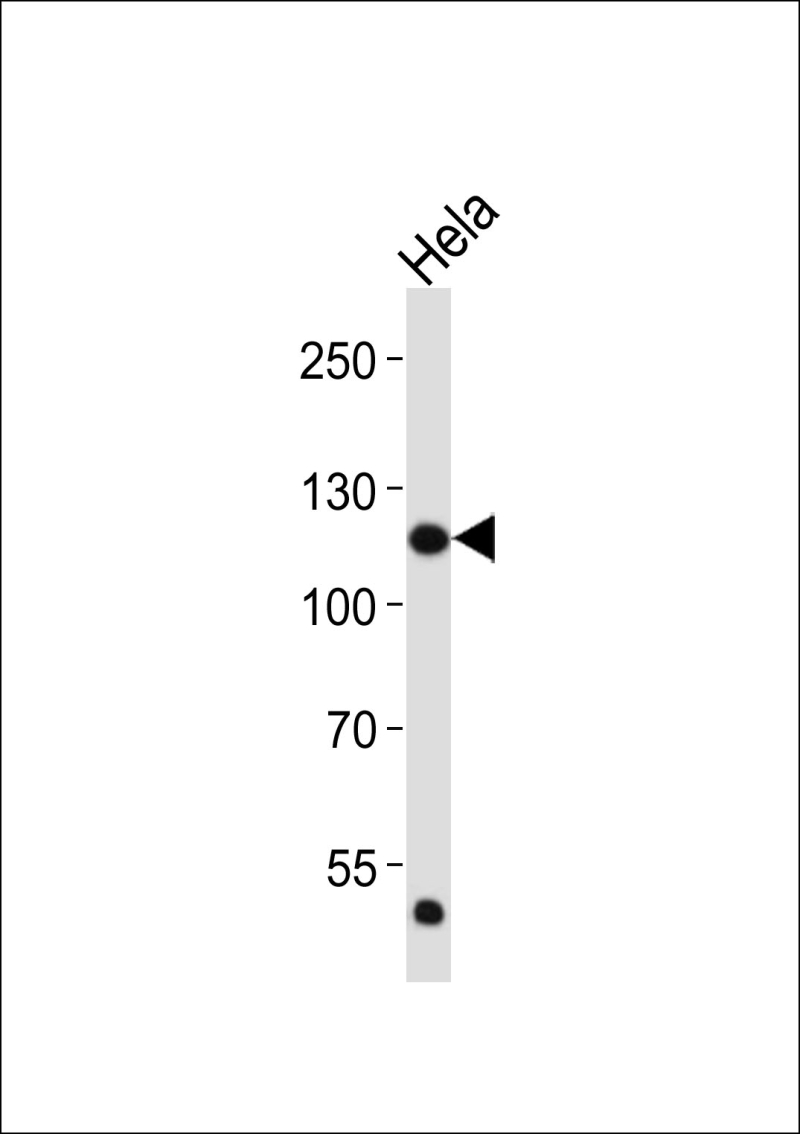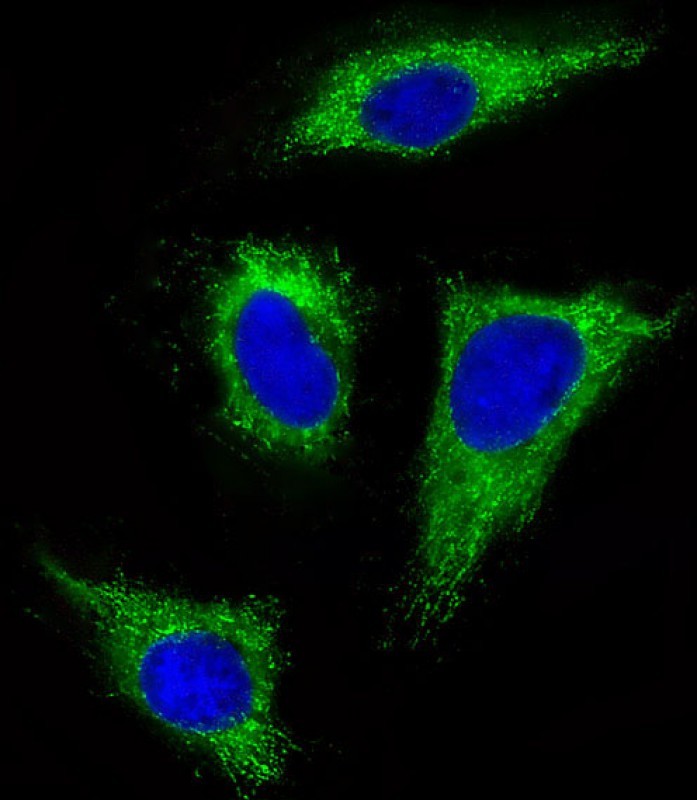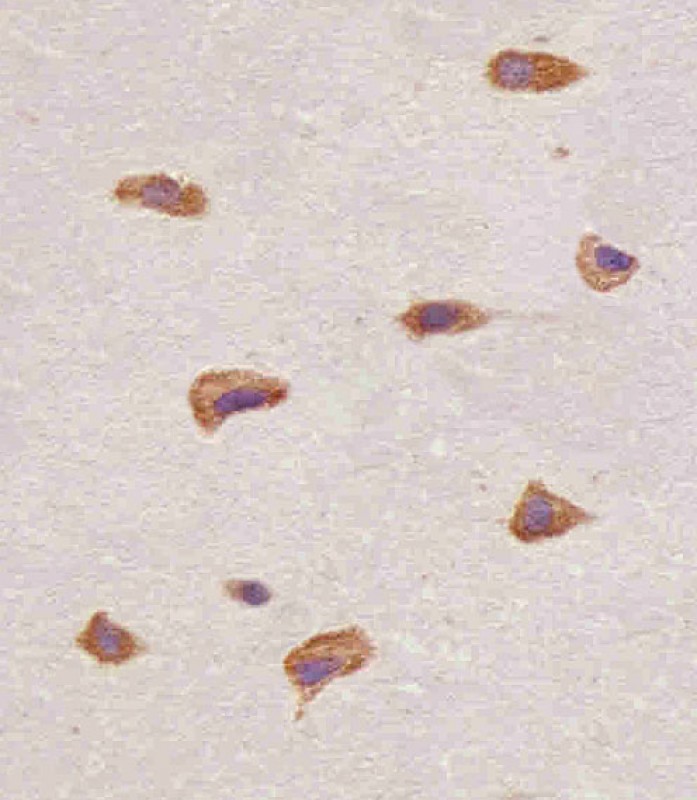


| WB | 1/1000 | Human,Mouse,Rat |
| IF | 咨询技术 | Human,Mouse,Rat |
| IHC | 1/100-1/500 | Human,Mouse,Rat |
| ICC | 1/25 | Human,Mouse,Rat |
| FCM | 咨询技术 | Human,Mouse,Rat |
| Elisa | 咨询技术 | Human,Mouse,Rat |
| Aliases | Fibroblast growth factor receptor 1, FGFR-1, Basic fibroblast growth factor receptor 1, BFGFR, bFGF-R-1, Fms-like tyrosine kinase 2, FLT-2, N-sam, Proto-oncogene c-Fgr, CD331, FGFR1, BFGFR, CEK, FGFBR, FLG, FLT2, HBGFR |
| Entrez GeneID | 2260 |
| WB Predicted band size | 91.9kDa |
| Host/Isotype | Mouse IgG1 |
| Antibody Type | Primary antibody |
| Storage | Store at 4°C short term. Aliquot and store at -20°C long term. Avoid freeze/thaw cycles. |
| Species Reactivity | Human, Mouse |
| Immunogen | This FGFR1 antibody is generated from a mouse immunized with a KLH conjugated synthetic peptide between 806-842 amino acids from the C-terminal region of human FGFR1. |
+ +
以下是3篇与FGFR1抗体相关的代表性文献摘要概述:
1. **文献名称**:*Therapeutic targeting of FGFR1 in non-small cell lung cancer through antagonistic antibody MW01*
**作者**:Zhao Y, et al.
**摘要**:研究团队开发了靶向FGFR1的单克隆抗体MW01.通过阻断配体结合抑制受体激活,在肺癌小鼠模型中显著抑制肿瘤生长并延长生存期,证明了其作为新型肺癌治疗药物的潜力。
2. **文献名称**:*Structural basis for antibody inhibition of FGFR1 activation in endocrine disorders*
**作者**:Huang X, et al.
**摘要**:通过冷冻电镜解析了抗FGFR1抗体(AB23)与受体复合物的三维结构,揭示了抗体通过结合受体胞外域D3区域阻断二聚化的分子机制,为内分泌相关疾病治疗提供结构生物学依据。
3. **文献名称**:*Bispecific antibody targeting FGFR1 and PD-L1 enhances antitumor immunity in solid tumors*
**作者**:Chen L, et al.
**摘要**:开发的双特异性抗体同时靶向FGFR1和PD-L1.在乳腺癌和胃癌模型中显示出协同治疗效果,既能抑制肿瘤细胞增殖,又可激活T细胞免疫应答,具有双重抗肿瘤机制。
注:以上为模拟文献案例,实际文献需通过PubMed(https://pubmed.ncbi.nlm.nih.gov)或Web of Science查询真实研究。
The fibroblast growth factor receptor 1 (FGFR1) is a transmembrane tyrosine kinase receptor that plays a critical role in regulating cell proliferation, differentiation, migration, and survival by binding to fibroblast growth factors (FGFs). Dysregulation of FGFR1 signaling, caused by gene amplification, mutations, or chromosomal translocations, is implicated in various cancers (e.g., breast, lung, and squamous cell carcinomas) and developmental disorders. FGFR1-targeted antibodies are therapeutic agents designed to inhibit aberrant FGFR1 activity. These antibodies typically block ligand binding, prevent receptor dimerization, or induce receptor internalization, thereby suppressing downstream signaling pathways like MAPK and PI3K/AKT.
Research on FGFR1 antibodies has gained momentum due to their potential to overcome resistance to other therapies, such as tyrosine kinase inhibitors (TKIs), and their specificity in targeting cancer cells with FGFR1 alterations. Preclinical studies demonstrate efficacy in reducing tumor growth and metastasis in models of FGFR1-driven cancers. However, challenges remain, including managing on-target toxicity in normal tissues expressing FGFR1 and addressing acquired resistance mechanisms. Clinical trials are ongoing to evaluate safety and efficacy in patients, often in combination with chemotherapy or immunotherapy. FGFR1 antibodies represent a promising precision oncology tool, though further optimization and biomarker-driven patient selection are needed to maximize therapeutic benefits.
×